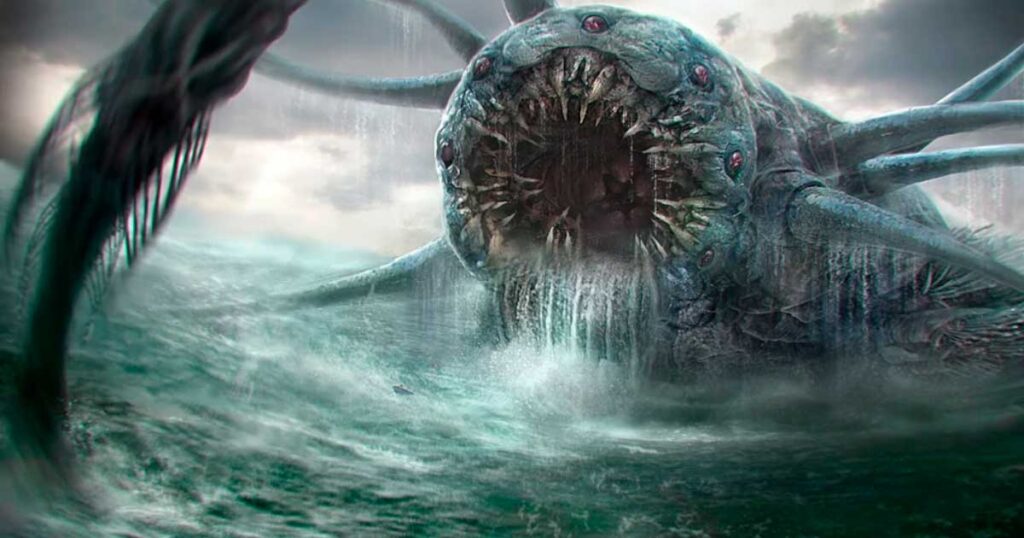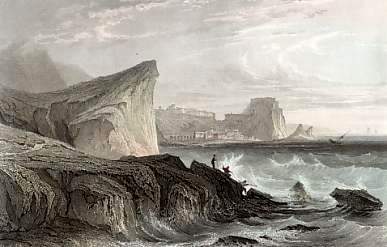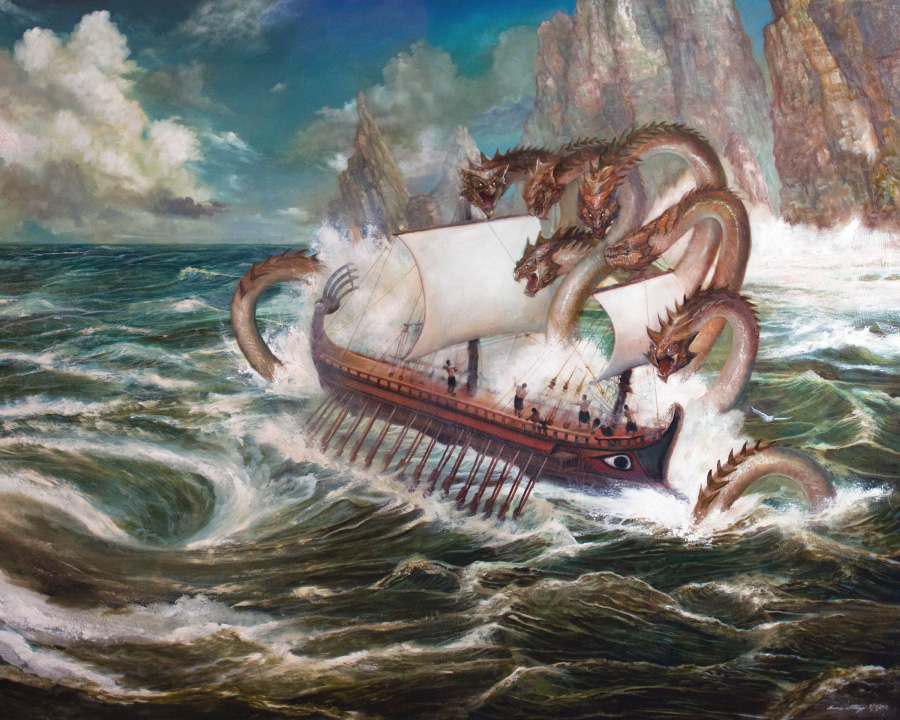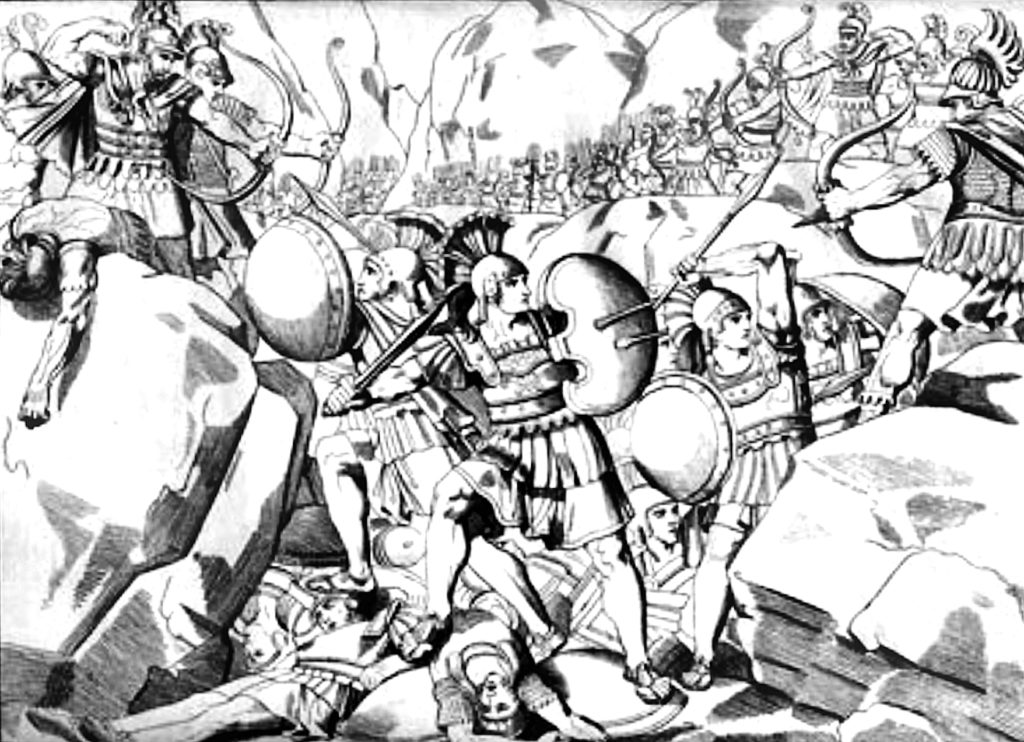Charybdis is a sea monster born of the Greek gods Poseidon and Gaia – the sea and the earth.
According to some accounts, Charybdis controlled the tides. In her endless thirst, she gulped great quantities of seawater and spit it out again, causing low and high tides each day. The name Charybdis comes from the ancient Greek words for swallow and belch.
She is featured in ancient texts such as the Aeneid and the Odyssey. Together with her sister Scylla, she guarded the Strait of Messina, a narrow stretch of water between Calabria and Sicily. Calabria makes up the southernmost point of the Italian mainland.
Charybdis represented a real whirlpool that sometimes appears there, and Scylla a rocky shoal. The passage is so narrow that it can be difficult for ships to sail safely past one without veering too close to the other.
This passage and the resulting stories gave rise to the phrase “between Scylla and Charybdis.” It describes being caught between two bad choices or two dangerous situations.
The phrase endured for centuries through many languages. It was even featured in political cartoons millennia after the stories were first told.

Daughter of Poseidon
In ancient Greek mythology, Poseidon was the god of the sea and one of the Twelve Olympians. He ruled over storms and earthquakes. He was also the mythological tamer of horses.
When the Titan Cronus was overthrown, his three sons divided creation between them. Zeus was given dominion over the sky, Poseidon the sea, and Hades was left with the underworld. The land, including Mount Olympus, was shared by all.
Sailors prayed to Poseidon for protection, but they also lived in fear of him. When the Greek hero Odysseus angered Poseidon by blinding one of his sons, the god sent storms that sank his ship and drowned his crew. This set off the hero’s famous ten-year odyssey back home.
Poseidon had many consorts and many children. His son Theseus was a fabled hero and the founder of Athens. His son Triton lived with Poseidon and the goddess Amphitrite in a golden palace under the sea. Orion found a place among the stars.
Charybdis lived under a rock.
The Origin of Charybdis
In the old myths, Charybdis was a loyal servant to her father. When Poseidon was fighting his brother over possession of coastal lands, Charybdis helped her father by drowning islands and coastlines in seawater.
Zeus punished her by chaining her to the sea floor.
After capturing Charybdis, Zeus transformed her into a hideous monster. He cursed her with an unquenchable thirst. Everafter, when she drank water from the sea, she created great whirlpools above.
This story may have come about from the existence of a real whirlpool in the Strait of Messina, which is caused by the meeting of currents and can present a danger to small boats in extreme conditions.

In other myths, Charybdis was not the daughter of a god but a human woman who stole oxen from Hercules, thus provoking Zeus’s anger and the curse.
Here is a passage from the Odyssey describing Charybdis:
Divine Charybdis terrified us all
by swallowing salt water from the sea.
When she spewed it out, she seethed and bubbled
uncontrollably, just like a cauldron
on a huge fire, while high above our heads
the spray rained down on top of both the cliffs.
And when she sucked the salt sea water down,
everything there looked totally confused,
a dreadful roar arose around the rocks,
and in the depths the dark and sandy ground
was plain to see. Pale fear gripped my comrades.
Between Scylla and Charybdis
The old idiom “between Scylla and Charybdis” has a similar meaning to the common phrase “between a rock and a hard place”. Sailors passing through the Strait of Messina worried that in steering too far from one monster, they would bring their craft within reach of the other.
Accounts differ regarding Scylla’s parentage, but in many, she is the daughter or granddaughter of Poseidon. In some traditions, she was also the daughter of Charybdis. In some stories, Scylla was a beautiful water nymph who was cursed by a jealous goddess.
The myth of Charybdis predates Scylla, who first appears in Homer’s Odyssey.
Charybdis of Ancient Epics
Charybdis appeared in many old stories, including several famous epics.
In the Odyssey, Circe warns Odysseus to steer clear of Charybdis. Scylla is terrifying, with “a dozen feet, all deformed, six enormously long necks, with a horrific head on each of them, and three rows of teeth packed close together, full of murky death.” But Charybdis is even worse.
“No sailors yet can boast they and their ship sailed past her without disaster,” Circe says of the first monster. “Each of Scylla’s heads carries off a man, snatching him away right off the dark-prowed ship.”
Even so, Circe urges Odysseus to steer close to Scylla to avoid Charybdis:
Just below that tree divine Charybdis
sucks black seawater down. She spews it out
three times a day, and then three times a day
she gulps it down—a terrifying sight.
May you never meet her when she swallows!
Nothing can save you from destruction then,
not even Poseidon, Shaker of the Earth.
Make sure your ship stays close to Scylla’s rock.
Row past there with all speed. It’s much better
to mourn for six companions in your ship
than to have them all wiped out together.’

Scylla snatches up six of Odysseus’s companions, “the strongest and the bravest men” he had, but the ship makes it through without being dragged down into Charybdis’s terrible whirlpool… only to be sunk by storms sent by a vengeful Zeus.
In the Argonautica, the sea nymph Thetis guides Jason and the Argonauts safely through the passage guarded by Scylla and Charybdis.
Charybdis was also mentioned in the Aeneid:
High from the shallows leap the surges hoar,
And surf and sand mix eddying. ‘Behold
Charybdis!’ cries Anchises, ”tis the shore,
The dreaded rocks that Helenus foretold.
Row, comrades, for dear life, and let the oars catch hold.’
Aristotle mentioned the great sea monster in his writings. In Meteorologica he wrote that the great storyteller Aesop taunted a ferryman by telling him that with one gulp from Charybdis, the sea would be gone and the ferryman would be out of a job.

